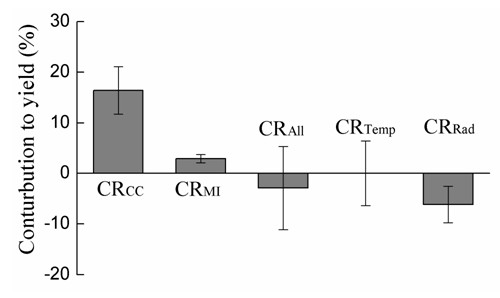陶福禄研究组发展新方法研究作物历史产量变化归因获进展
气候变化对农业影响评价受到品种、管理以及不同气候变量自相关等因素的干扰。
为了更客观理解气候的影响以及适应的作用,中国科学院地理科学与资源研究所陶福禄研究组发展了新方法开展历史产量变化归因研究,分解品种、管理、气候变化及各气候变量等因子对过去30年作物物候和产量变化的贡献。研究结果在该领域TOP一区期刊european Journal of Agronomy发表。

陶福禄研究组发展新方法研究作物历史产量变化归因获进展
研究发现对华北平原小麦而言,1981至2009年间,品种对产量变化贡献12.2-22.6%,肥料贡献2.1-3.6%,气候变化贡献-3.0-+3.0%,但对雨养小麦可达-15.0%,其中温度变化贡献为2.1-3.6%,辐射变化贡献为-12.0 --3.0%,气候变化的影响已达到观测产量变化趋势的−23.8-+25.0%。
研究论文被欧洲农学学会作为亮点报道。European Journal Agronomy 期刊主编认为:该论文重要,因为(1)中国对全球粮食安全极端重要;(2)论文收集中国过去30年的资料;(3)利用观测和模型模拟结合的方法。该研究在一个足够大的尺度上解析了天气、品种和农业管理等因素的影响,发现正负影响并存。因他们研究的科学问题、分析能力和产出这么好论文所付出的努力,作者值得祝贺。
原文链接:
Contributions of cultivars, management and climate change to winter wheat yield in the North China Plain in the past three decades
Dengpan Xiao, Fulu Tao
The detailed field experiment data from 1980 to 2009 at four stations in the North China Plain (NCP), together with a crop simulation model, were used to disentangle the relative contributions of cultivars renewal, fertilization management and climate change to winter wheat yield, as well as the relative impacts of different climate variables on winter wheat yield, in the past three decades. We found that during 1980–2009 cultivars renewal contributed to yield increase by 12.2–22.6%; fertilization management contributed to yield increase by 2.1–3.6%; and climate change contributed to yield genErally by −3.0–3.0%, however by −15.0% for rainfed wheat in southern part of the NCP. Modern cultivars and agronomic management played dominant roles in yield increase in the past three decades, nevertheless the estimated impacts of climate change on yield accounted for as large as −23.8–25.0% of observed yield trends. During the study period, increase in temperature increased winter wheat yield by 3.0–6.0% in northern part of the NCP, however reduced rainfed winter wheat yield by 9.0–12.0% in southern part of the NCP. Decrease in solar radiation reduced wheat yield by 3.0–12.0% across the stations. The impact of precipitation change on winter wheat yield was slight because there were no pronounced trends in precipitation. Our findings highlight that modern cultivars and agronomic management contributed dominantly to yield increase in the past three decades, nevertheless the impacts of climate change were large enough in some areas to affect a significant portion of observed yield trends in the NCP.

